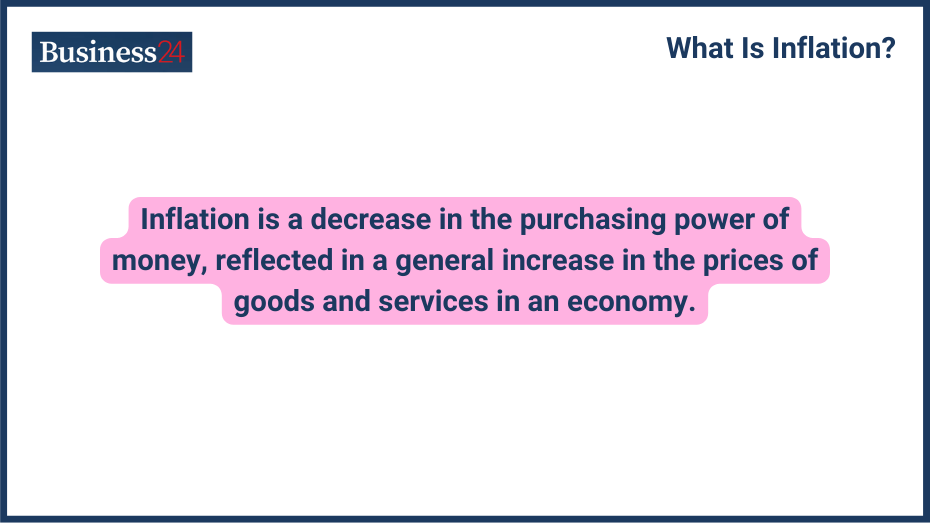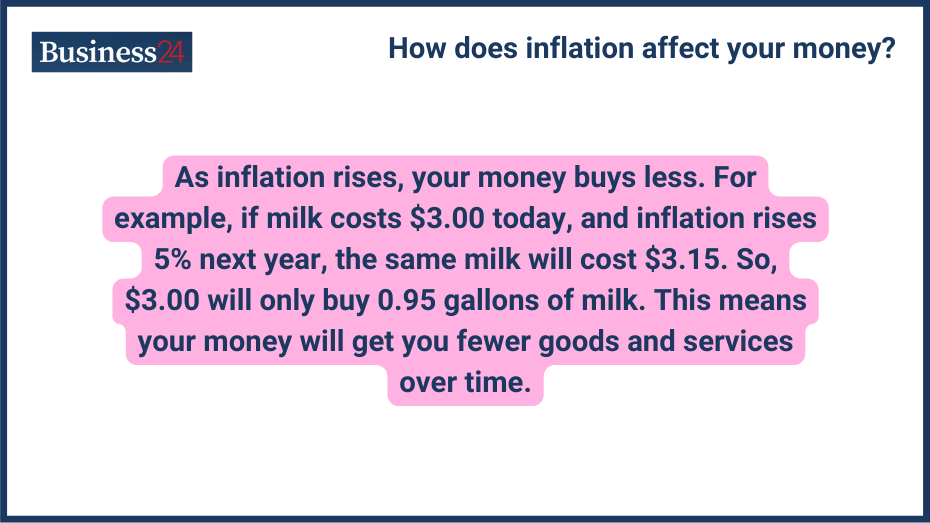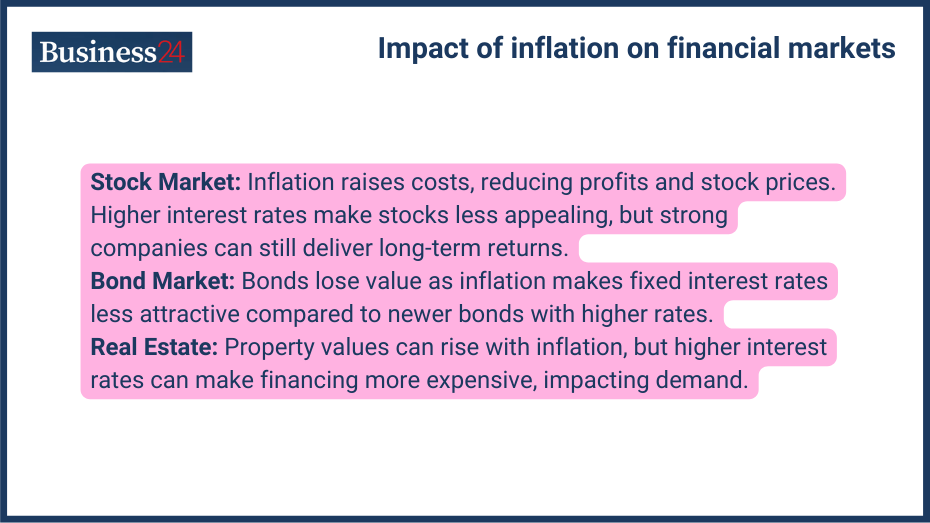
If you keep cash without making any returns on it, you are losing money. Do you think this is true? Yes, it is. If you don’t think it’s true, you might not know about inflation. In simple words, inflation is the rise in the prices of goods and services over time in an economy. For example, a bread loaf costing around $3 is highly likely to cost more than $3 due to inflation.
Inflation is measured by the Consumer Price Index (CPI), which tracks the average price changes for a basket of essential goods and services like food, transportation, housing, and healthcare. Inflation is not always bad; a small amount is considered healthy for an economy.
Decreased Purchasing Power
The main concern in rising inflation is the decreasing purchasing power; in high inflation conditions, sometimes people are not able to afford day-to-day essentials like bread or milk. Over time, with consistent inflation, the value of your money steadily decreases. Conditions can worsen if you are unable to maintain your standard of living and your income doesn’t keep pace with inflation.
Impact on Savings
The interest rate you earn on your savings accounts is usually low, and you can’t keep up with the inflation rate. This means that even though your savings account shows a positive balance, the real value of your money might be decreasing due to inflation. For example, if your savings account offers a 1% interest rate but inflation is at 3%, you’re losing 2% purchasing power on your savings each year.
How does inflation affect your money?

As inflation rises, every dollar will buy a lower quantity of goods. For example, you buy a gallon of milk for $3.00 today. If inflation rises by 5% next year, the same gallon of milk might cost $3.15. So, for $3, you will get only 0.95 gallons of milk. The money you have at the beginning of the year will get you fewer goods and services at the end of the year.
How does inflation affect financial statements?
Inflation directly affects the economy, and if the economy gets affected, it is obvious that businesses get affected. Also, in businesses, financial statements, such as income statements and balance sheets, are prepared based on historical costs. When inflation is present, the historical cost of assets and liabilities on a company’s balance sheet might not accurately reflect their current value. This can lead to distortions in financial ratios used to analyze a company’s performance.
Here is how inflation can affect different components of financial statements:
- Inventory: Generally, companies report inventory based on its historical costs, but if inflation is high, it can drive up the current price of inventory and result in a wrong interpretation of true value.
- Property, Plant, and Equipment (PP&E): Similar to inventory, PP&E is often reported at historical cost. Inflation can cause a company’s buildings, machinery, and equipment to be undervalued on the balance sheet, potentially impacting depreciation calculations.
- Long-Term Debt: The recorded value of a company’s long-term debt remains constant on the balance sheet, even if inflation has eroded the purchasing power of the money borrowed. This can make the debt appear more manageable than it truly is in an inflationary environment.
What impact does inflation have on financial markets?

In some countries, hyperinflation can cause major financial market events, like a stock market crash. One recent example is a financial crisis in Sri Lanka in early 2022; due to the crisis, the Sri Lankan stock market crashed nearly 50%.
Impact on different financial markets:
- Stock Market: Rising inflation can have a negative impact on stock prices in the short term. As the cost of production increases due to inflation, companies might experience lower profit margins. Additionally, rising interest rates, often implemented by central banks to combat inflation, can make stocks less attractive to investors compared to fixed-income investments offering higher yields. However, in the long term, healthy companies with strong growth potential can potentially outpace inflation and deliver positive returns for investors.
- Bond Market: Bonds are generally considered more vulnerable to inflation than stocks. Bonds offer a fixed interest rate payout over time. When inflation rises, the fixed interest rate on existing bonds becomes less attractive compared to newer bonds offering higher rates to account for inflation. This can lead to a decrease in the market value of older bonds.
- Real Estate: Real estate can be a hedge against inflation in some cases. Property values may rise alongside inflation, particularly in areas with strong demand. However, rising interest rates can also make it more expensive to finance a property, potentially impacting affordability and demand.
What are the Causes of Inflation?
The main reasons for inflation are:
- Demand-pull inflation: Occurs whenever demand for goods and services increases and exceeds the available supply. There are various reasons for demand-pull inflation, such as consumer spending, government spending, or rising exports. Businesses can raise prices to meet the higher demand, leading to inflation.
- Cost-Push Inflation: When businesses’ production costs increase due to factors like rising raw material prices, higher labor costs, or supply chain disruptions, this can lead to higher inflation. When raw material prices increase, businesses might pass on these increased production costs to consumers by raising prices.
- Built-In Inflation: This type of inflation arises from a phenomenon known as the wage-price spiral. As inflation rises, workers might demand higher wages to maintain their purchasing power. Businesses facing higher labor costs might then raise prices to maintain their profit margins. This creates a cycle where rising wages lead to rising prices and vice versa.
How to Mitigate the Effects of Inflation?
To manage and keep your financials healthy, you must know how to mitigate the effects of inflation:
- Investing in Inflation-Protected Securities: There are investment options like Treasury Inflation-Protected Securities (TIPS), which provide a hedge against inflation. As the cost of living rises, the value of your TIPS investment increases, protecting your purchasing power.
- Diversifying Investments: Different investment instruments react differently to the rising inflation; thats why diversifying your investments is important. You can spread your investments across various asset classes, such as stocks, bonds, real estate, and commodities, which can help mitigate risks associated with inflation.
- Maintaining an Emergency Fund: A readily accessible emergency fund allows you to cover unexpected expenses without going for a high-interest debt. This is especially important during inflationary periods when the cost of unexpected events can be higher. Additionally, an emergency fund can offer flexibility to take advantage of better interest rates on savings accounts that might emerge as inflation rises.
Does inflation reduce wealth?
The answer is easy: let’s say your net worth is $500k, and inflation is 3%, so if your money is not generated by more than 3%, the answer is obvious: it will decrease. If $500k generates 0 returns after a year, its purchasing power will be $485k. Investing in assets with the potential for long-term growth, like stocks or real estate (in some cases), can help your wealth keep pace with or even outpace inflation.
How Does Rising Interest Rates Affect Your Finances?
- Borrowing Costs: When inflation rises, central banks increase the interest rate, which directly affects consumer and business borrowings. Loans, mortgages, and credit card debt become more expensive. For example, if you’re planning to take out a mortgage, rising interest rates can significantly impact your monthly payments and potentially limit the amount you can borrow.
- Savings and Investments: The flip side of the coin is that higher interest rates can benefit your savings and certain investments. Savings accounts and certificates of deposit (CDs) typically offer higher interest rates when the overall interest rate environment rises. This can be an advantage if you have a significant amount of cash sitting in low-interest accounts. Similarly, fixed-income investments like bonds can offer more attractive yields when interest rates go up.
- Stock Market: Rising interest rates can have a complex impact on the stock market. While higher interest rates can make stocks less attractive compared to fixed-income investments with higher yields, the overall effect depends on various factors like company performance and future growth prospects. Rising interest rates might temporarily dip stock prices in some cases. However, healthy companies with strong fundamentals can still be good long-term investments even in periods of rising interest rates.
Strategies to Manage Inflation and Rising Interest Rates
Some strategies to manage inflation and rising interest rates:
- Adjust Budget and Spending: With rising inflation, you may need to cut down on your living expenses or earn more than you normally do. It is very important that you regularly review your budget and adjust your spending habits to account for rising prices and potentially higher interest payments on your debt. Look for ways to cut expenses and free up cash to manage higher costs.
- Long-Term Investments: Usually, strong fundamental companies beat inflation in the long term by great margins. You have to focus on those long-term investments with the potential to outpace inflation over time. You could analyze stocks of well-established companies with a history of growth or real estate in areas with strong demand.
- Debt Management: Debt can be a big problem in a high-inflation environment because one has to manage expenses simultaneously. Prioritize paying off high-interest debt, such as credit cards, as rising interest rates can further increase your debt burden. Also, focus on making timely payments and consider consolidating high-interest debt into a lower-interest loan if possible.
Educational Resources and Tools
You have to learn the tips and tricks and how to act in a high-inflation environment so you can pass the phase easily. There are various books, such as “The Investor’s Guide to Inflation” by John C. Bogle and “The Only Investment Guide You’ll Ever Need” by Andrew Tobias, from which you can learn a lot.
Several online platforms offer courses specifically designed to educate individuals on managing personal finances during economic challenges. These courses can provide valuable insights on budgeting, investing, and debt management in an inflationary environment.
Also, there are various online calculators that can help you plan your budget in the face of rising inflation. These calculators can help you plan your investments, manage debt repayment, and calculate the impact of inflation on your future goals.
Disclaimer
eToro is a multi-asset platform which offers both investing in stocks and cryptoassets, as well as trading CFDs.
Please note that CFDs are complex instruments and come with a high risk of losing money rapidly due to leverage. 61% of retail investor accounts lose money when trading CFDs with this provider. You should consider whether you understand how CFDs work, and whether you can afford to take the high risk of losing your money
This communication is intended for information and educational purposes only and should not be considered investment advice or investment recommendation. Past performance is not an indication of future results.
Copy Trading does not amount to investment advice. The value of your investments may go up or down. Your capital is at risk.
Crypto assets are complex and carry a high risk of volatility and loss. Trading or investing in crypto assets may not be suitable for all investors. Take 2 mins to learn more
eToro USA LLC does not offer CFDs and makes no representation and assumes no liability as to the accuracy or completeness of the content of this publication, which has been prepared by our partner utilizing publicly available non-entity specific information about eToro.
